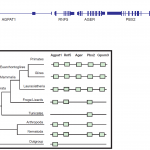atherosclerosis
One of the things that first led me to understand the dangers of quackademic medicine was a trial known as the Trial to Assess Chelation Therapy, or TACT. Chelation therapy, as you might recall, is the infusion of a chelating agent, or a chemical that binds heavy metals and makes it easier for the kidney to secrete them, in order to treat acute heavy metal poisoning. Unfortunately, quacks of all stripes have latched on to chelation therapy to treat a number of diseases and conditions. For instance, antivaccine quacks like to use chelation therapies to treat autistic children using the…
Figure 1 showing RAGE (aka: Ager) expression only in mammals from Sessa et al., PLOS ONE. 9(1): e86903, 2014.
RAGE stands for "receptor for advanced glycation end-products", also known as "AGER", and new research shows that it first appeared in mammals (Sessa et al., 2014). Despite the name, the receptor also binds other signaling molecules such as HMGB1, S100 proteins, beta-amyloid, phosphatidylserine, among others (Xie et al., 2013). RAGE is reportedly involved in diabetes, cardiovascular disease, atherosclerosis, osteoarthritis, cancer, Alzheimer's disease, as well as liver and renal…
Image of a grizzly bear at Yellowstone National Park from http://free-naturewallpaper.com/nature-images/animals/bears/Grizzly-at-…
I was so excited to see a story featuring grizzly bears (Ursus arctos horribilis) in the Wall Street Journal yesterday. The article was about how Dr. Kevin Corbit at Amgen Inc. is studying grizzly bears in the Bear Center at Washington State University to learn more about obesity. The 12 animals living in the facility were either rescued from places where they were captured after getting too close to humans or were born at the facility. Dr. Corbit was quoted in…
There are many fallacies that undergird alternative medicine, which evolved into "complementary and alternative medicine" (CAM), and for which the preferred term among its advocates is now "integrative medicine," meant to imply the "best of both worlds." If I had to pick one fallacy that rules above all among proponents of CAM/IM, it would have to be either the naturalistic fallacy (i.e., that if it's natural—whatever that means—it must be better) or the fallacy of antiquity (i.e., that if it's really old, it must be better). Of course, the two fallacies are not unrelated. In the minds of CAM…



